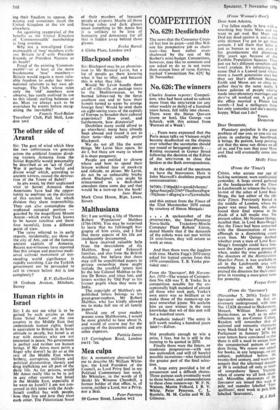COMPETITION
No. 629: Desdichado
The news that the Consumer Coun- cil has lost its grant—and Des Wil- son his prospective job as chair- man—has been rather over- shadowed by the rest of Mr Barber's mini-budget. Competitors, however, may like to comment and are asked to do so in not more than sixteen lines of verse. Entries, marked 'Competition No. 629; by 20 November.
No. 626: The winners
Charles Seaton reports: Competi- tors, who had been asked to submit items from the sPEcTieroa (or any other weekly or daily) of a hundred years hence, fell tidily into classes. There were the Status Quo-ers (more or less), like George van Schaick. with this extract from 'Portrait of a Week': . . . Fears were expressed that the Paris peace talks on Vietnam might become deadlocked on the dispute over whether the secretaries should use round or hexagonal pencils Rioting occurred in Gower Street following the decision of the Editor of the SPECTATOR 10 close the Spiders in the Bath correspondence.
At the other end of the spectrum we have the Innovators. Here is John Maxwell's doubtless pregnant communication: 34700x / 2'00pdPrl =qwstklvbctun / 3ghqvbnc(pd)12345*Therforzdfsgw -70ihnno+dfsgwq'a=cgoxwrdsabc and this extract from the Times of the 32nd Marstember 2070 comes by courtesy of Simon Marquis: I A spokesrobot of the
1PNSTMCPRU, the Inter-Planetary
Nova-Stella Trajectory-Missile Computer Plant Robots' Union, stated bluntly that if the demands of the robots were not met within 24 mini-hours, they will return to work at once.
And then there were the jugglers with time. Martin Fagg's 2070 entry asked for typical entries from this 1970 competition. T. B. Yorke pro- vided one: From the 'Spectator', 8th Novem- ber, /970—The winner of Competi- tion No. 626 was T. B. Yorke. In a competition notable for the ,ex- ceptionally high standard of almost all those who took part, Yorke's own entry was so brilliant as to make those of the runners-up ap- pear somewhat jejune. We acclaim him an easy winner in the sure knowledge that wit of this sort will last a hundred years.
Prophetic indeed! The entry is Still worth reading a hundred years later I—Editor.
Not prophetic enough to win a prize, I fear, but he is still in the running to be quoted in 2070.
Finally there were the Inters, or moderate progressives—with not too outlandish and still (if barely) possible narrations—who furnished the greater part of the final selec- tion.
A large entry provided a lot of amusement and a difficult choice. Three guineas each eventually went to those below, and commendations to these close runners-up: W. F. N. Watson. Martin Folkard, J. R. V. White. Peter Peterson, C. L. Bundela. M. M. Carlin and W. D, Gilmour, (From 'Woman's Own') Dear Aunt Adastra,
I've fallen madly in love with a smashing boy from Mars and we want to get wed. But Mum and Dad are dead against it, and as I'm only thirteen I've got to get their consent. I tell them that Splat is just as human as we are, ex en if his grandparents did planetrate fifty years ago because of the Earthite Population Squeeze. They just say he's different somehow and won't explain. It's infuriating be- cause Dad is a Lunoid (and what's more a fourth generation one) but they say that's different because Earth and Moon are so close to- gether they're the same really. I know galaxies of people who've made inter-planetary marriages and they've all worked out. A girl at the office married a Plutan last month—I had a stellagram from her only yesterday and she's starrily happy. What can I do?
Yours. Desperate Dear Desperate, Planetary prejudice is the great problem of our eon, so you are not alone in enduring the heartbreak it brings. Be patient, keep pointing out that the same sun shines on all of us. and I'm sure that your Mum and Dad will eventually come into orbit.
Molly Fitton Fergus Porter (From the 'Spectator')
(November 7, 2070.) Today the Spectator celebrates its first an- niversary underground, with issue No. 12,628 devoted to Shakespeare. Mozart William Morris and Burne-Jones, as well as to other influences in pm-Cosmic Culture. Readers will remember that all national and romantic visionaries were black-listed by act of World Parliament in January 2070; but your letters have convinced us that there is still a need to escape front the computerised pattern of mo- dern living. We renew our appeal for books, in any language, on any subject, published before the twenty-first century, and warn mes- sengers that the televisual detector at 99 is switched off only at hours of compulsory Space Training, when of course we all look identi- cal. Microfilm photostats of the Spectator are issued this week in pale red capsules labelled 'Tran- quillisers', next week in pale bIlles labelled 'Souvenirs', N.1. Rock
(From the 'Times')
Critics, who accuse our age of lacking sentiment, were confounded yesterday. A large crowd gathered at the headquarters of the Times in Letchworth to witness the laying- to-rest of the ashes of Lord Rees- Mogg, the last editor of the old- style Times. Previously buried in the middle of London, where the paper was once based, the ashes found their final repose in the shade of a tall maple tree. The present editor, Mr Norman Quinge, recalled that, in Lord Rees-Mogg's day the Times had been concerned with the dissemination of news, although to a diminishing extent even then. Mr Quinge doubted whether even a man of Lord Rees- Mogg's foresight could have fore- seen the paper's present prosperity when, under the wise guidance of the directors of the Hertfordshire Marches Press, it was available to all In the Letchworth area with something to sell. Mr Quinge praised the directors for their enter- prise in rescuing a once-great name for posterity.






















































 Previous page
Previous page